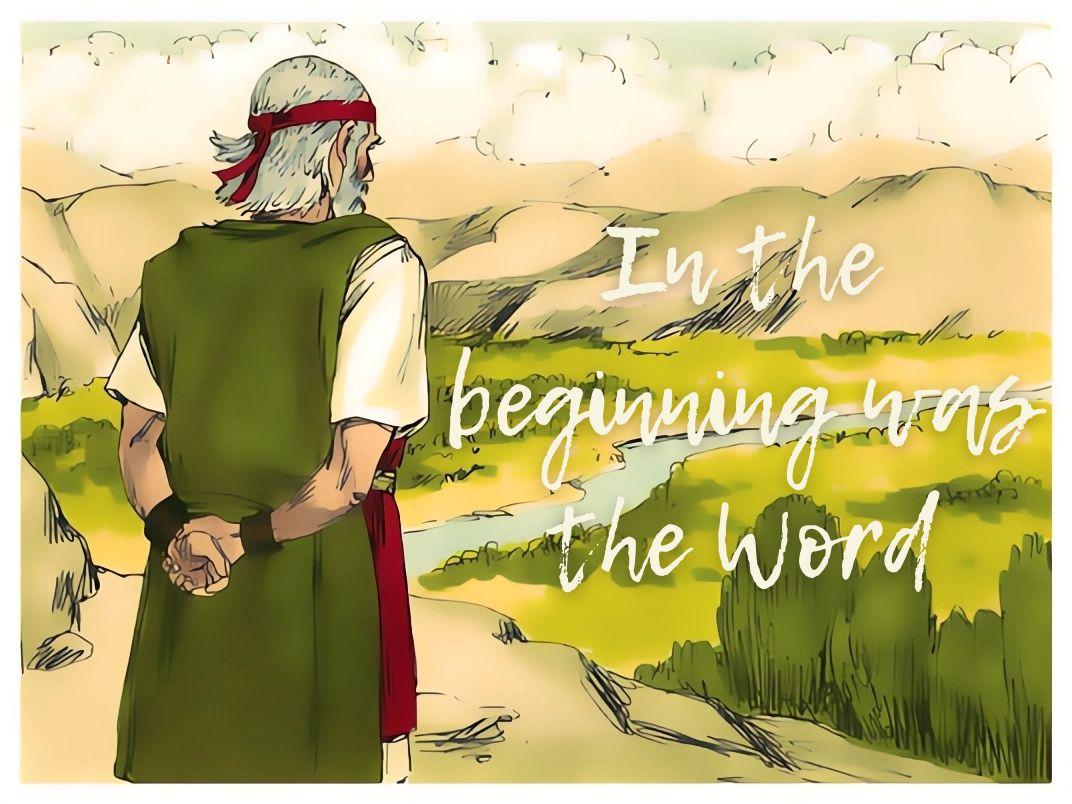Mistakes in sacred texts are inevitable. Original sources are edited based on political circumstances—fragments are discarded or added as needed. Scribes err, originals vanish, and words shift meanings over millennia. Certain knowledge is lost, idiomatic expressions evolve, and translators often choose the wrong meaning from a word’s multiple definitions. You could even call this a law: when information is passed from person to person over thousands of years, distortion is inevitable.
Take, for example, the opening line of John’s Gospel: “In the beginning was the Word.” What beauty! Poets adore it.
The New Testament was written in a Greek dialect, and the original text uses the word Logos. But λόγος isn’t just “word”—it also means “law,” “meaning,” “cause,” or “thought.” A more accurate translation might be: “In the beginning was the Idea.” Among classic translation errors are Moses’ horns and the mix-up between “rope” and “camel.” Remember the opening of Snatch? The thieves debate how Christians built the entire concept of immaculate conception from a mistranslation of parthenos (“maiden”) as “virgin.”
A well-supported theory argues that the Jewish custom of separating meat and dairy also stems from a translation error. The reference is to the famous commandment: “Do not boil a kid in its mother’s milk.” This phrase has been interpreted countless ways and underpins the rules of kashrut. Rabbi Abraham Ibn Ezra believed the prohibition targeted cruelty. Maimonides and Don Isaac Abravanel claimed boiling a kid in its mother’s milk was part of pagan rituals, and idolatry was strictly forbidden.
Yet there’s a more compelling explanation. “Do not boil a kid in its mother’s milk” appears three times in the Torah, never as a standalone commandment—always as an addendum:
- Bring the firstfruits of your land to the house of the Lord your God. Do not boil a kid in its mother’s milk (Exodus 23:19).
- Bring the firstfruits of your land to the house of the Lord your God. Do not boil a kid in its mother’s milk (Exodus 34:26).
- Do not eat any carcass; give it to the foreigner residing in your towns, and let them eat it, or sell it to them, for you are a holy people to the Lord your God. Do not boil a kid in its mother’s milk (Deuteronomy 14:21).
Prohibitions are typically direct: “Do not steal” or “Do not kill.” Why not state “Do not eat meat with dairy”? Likely, the original text was metaphorical—something like “Strike while the iron is hot.” Then the meaning of all three passages becomes clear.
The loss of the original meaning likely occurred during a period when oral study of the Bible ceased due to a lack of written commentary. This might have happened in the 6th century BCE, when Nebuchadnezzar’s forces destroyed the Jewish state, the Temple was razed in 586 BCE, and surviving Jews were exiled to Babylon. During this time, Jews abandoned livestock farming, nearly forgot spoken Hebrew (replacing it with Aramaic), yet written Hebrew survived. The problem lies in the Hebrew phrase לא תבשל (“do not boil”), which has two meanings: “do not make ripe” and “do not boil.” It’s plausible that during exile, the proverb was forgotten, and when Bible study resumed, the phrase was interpreted literally, tied to cooking.
An entire tradition born from a linguistic error
Imagine that the entire kashrut system—with its meat/dairy dish separation, dozens of volumes of interpretations, and absurdities—arose from a translation error.
p.s. The lost metaphor
Picture inserting a snappy proverb like “Don’t pull a cat by its whiskers, barefoot” for poetic flair. After centuries, the metaphor’s meaning vanishes, but the text remains. Priests then write entire volumes claiming the phrase proves the people’s unparalleled humanity in refusing to torment animals. Heretics, meanwhile, insist the cat is an ancient, untouchable creature—never to be approached barefoot.
And so it begins.
Conclusion: Bridging time and meaning
The story of errors in sacred texts reminds us that language is a fragile thread connecting past and present. From Logos to parthenos, every word carries the weight of history—and the risk of misinterpretation. Yet in an age where precision matters more than ever, ATT Translation offers a lifeline to those seeking to honor the original intent of Hebrew texts.
Whether you’re translating ancient scrolls, modern contracts, or cultural artifacts, our team of Hebrew specialists combines linguistic rigor with cultural sensitivity. We don’t just translate words—we decode their layers of meaning, avoiding the pitfalls of mistranslation that have shaped centuries of tradition.
Why choose us?
✅ Historical Context Mastery: We analyze terms like לא תבשל (“do not boil”) through the lens of their original context, distinguishing metaphor from literal instruction.
✅ Precision in Polisemy: Words like דֶּרֶךְ (“way/path”) or קָדוֹשׁ (“holy”) are translated with nuance, never reduced to oversimplified equivalents.
✅ Cultural Bridge-Building: From Talmudic texts to contemporary Israeli literature, we preserve the rhythm and intent of Hebrew’s unique voice.
The stakes are high: a mistranslated phrase can distort meaning, alienate audiences, or—like the kashrut system—birth unintended traditions. At ATT Translation, we treat every project as a sacred trust, ensuring your message resonates across time and cultures.
“Language is the mirror of the soul,” wrote the poet. Let us polish that mirror for you.
Ready to preserve the essence of your Hebrew texts?
Contact us to explore how we can safeguard your words against the sands of time.
Final Note:
The next time you read “In the beginning was the Word,” remember: behind every translation lies a choice. Choose clarity. Choose ATT Translation.


Leave a Reply